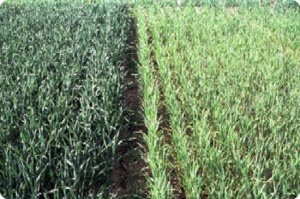Soil Fertility Extension Program

N deficient wheat, Havre, 1996. Image by R. Engel
The Soil Fertility/Nutrient Management program at MSU focuses on the processes that affect soil fertility and nutrient losses so that nutrients can be managed more sustainably. Soil testing can detect low nutrient levels that lead to possible crop nutrient deficiencies. In addition, soil testing allows for timely adjustments in fertilizer applications, reducing input costs. Understanding the economics of fertilizing, yield goals, and crop quality, along with soil fertility management can assist the producer in meeting profit goals.
Research conducted at MSU, the Agricultural Research Centers, and throughout the region are synthesized into fact sheets, modules, and presentations geared toward extension agents, crop advisers, farmers, ranchers, and/or homeowners. The current research focus is on cropland soil acidification, improving nitrogen management in dryland cropping systems, and sulfur fertilization rates for canola, pea, and wheat.
Use the search bar below to find information on specific soil fertility topics:
If you have any questions about soil nutrients, the Soil Fertility Extension program or materials contained in this web site, contact Dr. Clain Jones. If you think plant growth issues may be related to pesticide (e.g., herbicide residual in compost), please contact Damian Stoy (damian.stoy@montana.edu) or Dr. Tim Seipel (timothy.seipel@montana.edu; 994-4783) for assistance.
What's New:
- The Roots of Soil Health: Benefits of Perennials and Recrop - Dec 2025 presentation by Clain to Montana Organic Association. pdf of his slides
- More compost may not be what your garden soil needs - MSU Press Release - May 2025
- Differentiating Physiological & Fungal Leaf Spots - MSU Ag Alert - May 2025, and Northern Ag Network interview with Clain on the PLS
- Mitigating Nitrate and Managing Fertility in Annual Forages - Northern Ag Network interview with Clain and Hayes Goosey, MSU Extension Forage Specialist - May 2025
- Building Healthy Garden Soils, a recording of Clain's April 2025 presentation to Valley County gardeners.
- Lives and Landscapes article on Home Garden Soil Testing and Fertilizer Guidelines (Spring 2024 issue)
- Timely Topic: Optimal N and S rates for annual forage grasses - MSU press release - April 2025
- Timely Topic: Adding pulse grains to wheat rotations can increase economic returns - Jan 2025 and Northern Ag Network interview
- Drought resources:
